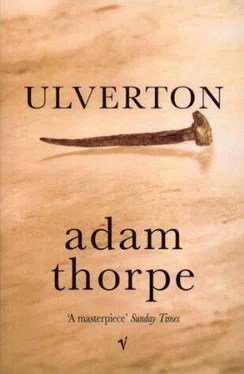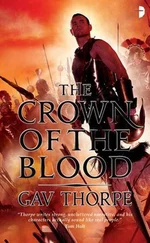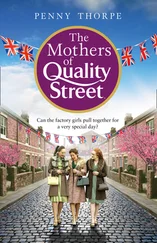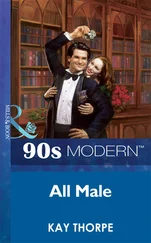Here, however, in the still-remote country, these town-bred educators might see, all about them, old things put to new and unlikely uses: each summer I have seen the children make their camps beside the river out of old iron bedsteads threaded with reeds, and sods piled on the top and sides, and an old iron pot glowing through the night, so that sometimes I have felt back in the days when our ancient warrior was flesh and blood, polishing his sword before a smoking hut. I have seen a waggon wheel become a merry-go-round (of sorts) twirled on its hub, while a rusty plough-wheel has served as a champion hoop, kicking up the dust down the Fogbourne Road for a good half-mile before burying itself in the hedgerow not three feet from me, shedding clouds of Old Man’s Beard upon my own. I have stood upon many a peg-rug woven from a lifetime’s worn-out garments, warming my hands in as pleasant a fug of reminiscence and tobacco as any London drawing-room might provide. And as for the bits and pieces to be found reincarnated in the humble cottage garden! — digression’s confined space dictates I must mention only the most memorable (and perhaps tragic) instance, in which I discovered over fifty irreplaceable glass-plate negatives nestling amongst the weeds of a neighbour’s ragged patch. Apparently the previous occupant, an old labourer named Jo Perry (a rather tiresome, rambling fellow according to Mrs Holland, who employed him in his latter years as a handyman and gardener, and who was left the sum of his worldly goods) had used them as cloches for his cabbages. Sadly, most of them were ruined, scoured clean by unnumbered seasons. The few that survived include a fine study of our former blacksmith’s shop (now a garage for motor-car repairs); a remarkable portrait of an old peasant woman of the last century; and a candid study of the village schoolmaster of some seventy years ago, which sparked memories and thereby spawned a book [ No Dead Men, No Tales , 1919] for which I was accused of libel by our local doctor — but that little episode must await its proper turn. Suffice to say that each negative, once developed, showed the degree of loss occasioned by this otherwise resourceful adaptation — though none could say with certainty who the masterly progenitor was (see also Chapter VII).
To return to the scene, on that mild October day of 1914: there in the pig-pen, as I had surmised, stood Percy Cullurne, indifferent to the metrical taunt of the village urchins. He was scattering straw across the churned, stinking mud, and when I shouted at the children and made for them with my doughty Indian walking cane, he looked up only for a moment, returning to his sows as the chanters scattered in squeals and giggles. One of them threw a pebble vaguely in my direction, but the force of gravity sufficiently enfeebled it to close its parabola with a ‘ping’ on the handle of the village pump. I felt a sudden darkness of mood close over me, and felt quite incapable of conversation. Or perhaps I was embarrassed, somehow, by the humiliation of the man. I walked away without a word or a glance. Hardly had I returned to my cottage and slumped into my chair when a feeling of shame rose within me: Cullurne had felt neither humiliation nor oppression, I was sure. That is the true power: to recognise that it is one’s beholders that impose these things upon one, and that the soul remains uncorrupted, untouched.
Perhaps there was some deep connection working, for ‘Wipers’ had begun a day previously, and Mrs Trevick received the news soon after that her husband had been killed in action. I have done some research since then: it was at about the same time as I was crossing the square that a burst of machine-gun fire cut Marlers Trevick in two, almost upon enemy lines. His unit was all but wiped out in those few, terrible minutes. It was from roughly that day that Percy Cullurne’s nickname changed from ‘Yeller’ to ‘Bidatome’. I never heard the chant again. ‘Bidatome’ he bears still, if somewhat worn by use and laziness to ‘Bid’m’. But even ‘Bid’m’ reminds us of its origin, much as an old coin reminds us of some great monarch, though the head be almost smoothed away.
As Ypres claimed man after man who had stood shoulder to shoulder on that August evening, and November came in cold and wet, a terrible nightmarish atmosphere descended upon Ulverton — so that it seemed, at times, as if I never truly woke up out of my own night horrors, but walked the streets of the damned. Few of those young men would be returning after all, to seed the land and bring the next harvest in, to hand on their qualities, to keep the heart of the village pumping strong. Cullurne kept a silence that even I could not break. Up on the downs, brushing without a word at the burial site, we would hear the bell tolling in long, slow arcs of sound, and the Squire would whiten as we paused, wondering again — who?
One afternoon young Sidney Bint came running up the track towards us, soon after we had heard the bell once more. He panted upon the rim.
‘Well?’ snapped the Squire. His eyes, I noticed, were full of fear.
The lad took a deep breath.
‘It’s Mr Allun, sir.’
‘Allun?’
‘He’s back.’
‘They’ve sent him back? Was that the tolling?’
‘Reverend axt as to make an apology, sir. ’E’s not dead, sir.’
The Squire closed his eyes.
‘Thank God,’ he sighed. ‘I’ll go and see him.’
The boy shifted from foot to foot. I asked him if there was anything else he wanted to say. He stared for a moment at the skeleton, although he had seen it some days before, when he had brought the news of Herbert Daye’s death (the young man who had made my bookshelves too small) from ‘injuries received’ and so forth. The Squire was climbing the ladder, and Lock was looking slightly piqued, as if Allun was likely to slip on his chauffeur’s gloves immediately.
I think I had guessed what the boy was going to say.
‘’E’s got no arms, sir.’
The Squire paused on the rim, feet still resting on the ladder, hands ready to push him onto the level. I remember his back against the sky, his drooping shoulders, his bowed head. He looked colossal, the very figure of utter and deep weariness. Dart laughed.
Allun put a brave face on it. He had been handling a grenade, a German stick type, attempting to pick the thing up and hurl it back. He lost one arm immediately and, as he put it, ‘thought as how it would miss the gear-stick, look’. His other arm developed gangrene in the flesh-wound. He was terribly thin, stranded amongst his automobile mementoes in the estate cottage, his wooden prostheses lying weirdly across the table while his stumps ‘took a bit of a rest, look’.
Soon afterwards we spent our last afternoon on the downs: the weather was blowing cold and the soil was hardening with the sharp night frosts of late November. We had dug right round the skeleton, and it was lifted by means of a pulley and our hands onto the side. Wrapped in canvas, the body of the ancient was placed on cushions in a cart, and then, at a nod from the Squire, taken slowly down the track, the great iron-tyred rims circling through the ruts and over flints so cautiously we could count the spokes … eight, nine, ten, eleven, twelve. Twelve. The number the war eventually claimed from our village. The Squire followed the bier down like a mourner.
As I watched them go, preparing to clear the site of our implements, Ernest came up with the wooden box in which he had placed the smaller finds. I asked to see them, perhaps for the last time, before they were assigned to some dusty glass case. Like a boy with his stone collection, he handed them to me one by one: the bronze dagger, and the iron hair-pin; a polished greenstone wrist-guard (or so we guessed), with nine holes at each end capped with sheet-gold, and broken — probably as part of a ritual; and a bone pendant, stained by the corroding dagger, found beside the ribs, carved into the form of a leaping animal (a hare?) and painfully crude. Hardly a treasure. But each, as it lay in my hand, had an extra weight; of silence perhaps, ‘deep as Eternity’, and the value of silence, that had lain unstirred under tussocks and cloud for four thousand years, until the Squire smote through the turf with his blade.
Читать дальше










